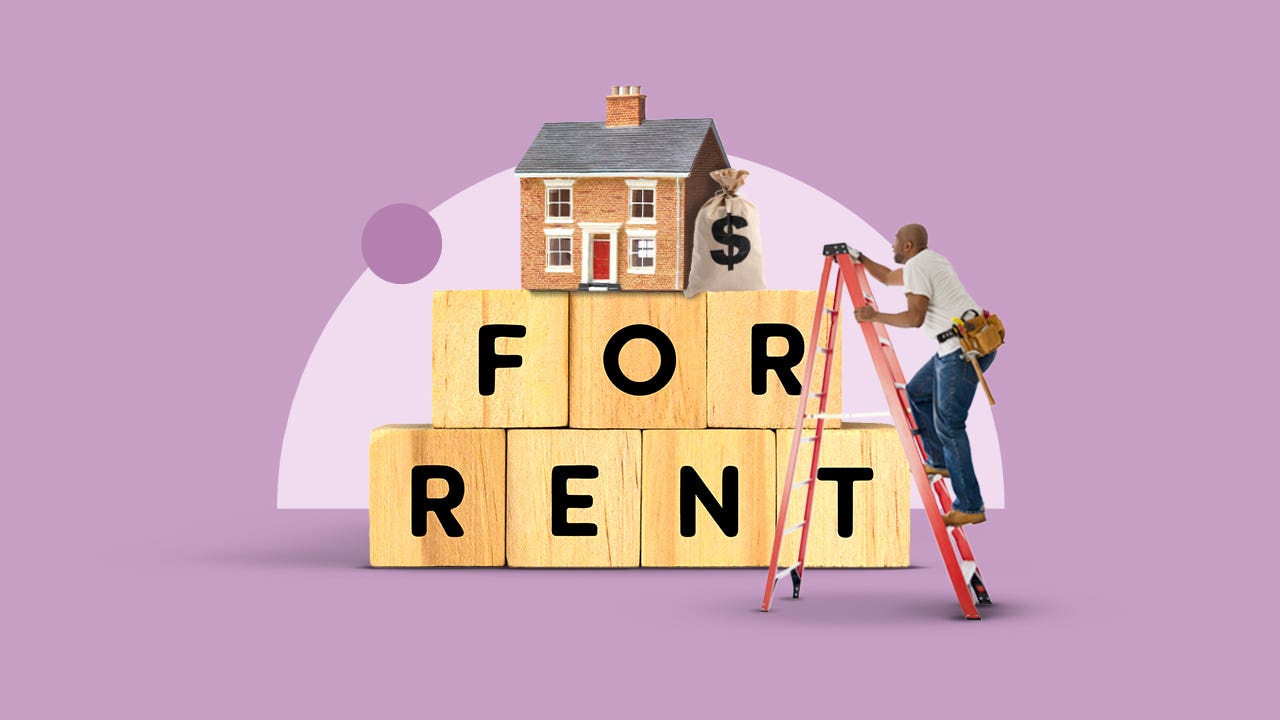Can you get a home equity loan on investment or rental property?




Key takeaways
- You can get home equity loans on investment and rental properties, though they may be harder to obtain.
- To get this type of loan, you’ll usually need a stronger-than-average financial profile and substantial assets.
- A rental or investment property home equity loan could come with tax benefits, depending on how you use it.
A home equity loan allows you to tap the value of your property to obtain a one-time lump sum you can use for any purpose. Most homeowners take out these loans on their primary residences. But can you get a home equity loan on an investment or rental property?
If you have sufficient equity in it — potentially, yes. That said, the application process can be more challenging, and you could end up with a higher interest rate and paying some extra expenses to boot.
So, if you’re considering a rental or investment property home equity loan, here are a few home truths to consider.
- Investment property
-
Investment property is real estate that is bought with the intention of producing a financial return, as opposed to the owner’s occupation or personal use. The financial return is usually in the form of income from rents or leases, though it can also come from a profit when the property is sold (due to appreciation).
Can you get a home equity loan on rental property?
The short answer: Yes, it’s possible to get a home equity loan on a rental property.
However, in the eyes of a home equity lender, an investment property can seem like a riskier proposition. “Investment properties, unlike your primary residence, come with the liquidity risk that tenants may leave or not pay rent,” says attorney Nik Agharkar, owner/managing member of Crowne Point Tax & Wealth Counsel in Wyckoff, NJ. That could jeopardize your repayments but – unless you also live in the rental – you’re more likely to just walk away and cut your losses (or so the lender figures).
As a result, it might be harder for you to find a lender willing to tie a home equity loan to an investment property or a rental. If you do find one, you’ll likely pay more in interest to compensate for that risk. Also, “the bank may be quicker to foreclose on an investment property that is not generating sufficient revenue to meet the monthly debt obligations,” Agharkar says.
Requirements for a home equity loan on investment property
The requirements for home equity loans for investment properties and rentals vary by lender. But they tend to be tougher than those on loans securitized by residences. In general, you can expect to need:
- Minimum credit score: 700 or higher
- Maximum debt-to-income (DTI) ratio: 43 percent (sometimes up to 50 percent)
- Maximum loan-to-value (LTV) ratio: 75 percent
- Reserves: six months’ to 15 months’ worth of loan payments
Comparing home equity loans on residences vs. investment properties
| Loan features | Primary residences | Investment properties |
| Minimum credit score | 640-680 | 700-720 |
| Maximum DTI ratio | 43-50% | 43% |
| Maximum LTV ratio | Up to 80-95% of home value | Up to 75% of property value |
| Recommended cash reserves | none (but need 20% equity stake) | On average, 6-15 months of payments |
| Avg. interest rate | 8.23%* | 1.5% higher than residential rates |
Lenders may also look at the property’s income-generating record. If it has a history of a steady, positive cash flow and high occupancy, that’s a plus. In contrast, if it has a high turnover rate and long stretches of no income, that can be a potential red flag for lenders.
HELOC or home equity loan: Which is better when tapping investment property equity?
Deciding between a home equity line of credit (HELOC) and a home equity loan for tapping equity on an investment property depends on various factors, including your financial goals, risk tolerance, and specific circumstances. Here’s a comparison of the two products in a nutshell:
HELOC
- Flexibility: HELOCs offer a revolving line of credit, allowing you to borrow funds as needed, up to a certain limit, and repay them over time.
- Variable Interest Rates: HELOCs usually come with variable interest rates, which change with market conditions. This means your monthly payments may fluctuate.
- Interest-Only Payments: During the draw period (typically 5-10 years), you may only need to pay back interest payments, followed by principal and interest payments during the repayment period.
- Risk: HELOCs can be riskier due to potential interest rate hikes, which could increase your monthly payments.
Home Equity Loan
- Lump Sum Payout: With a home equity loan, you receive a lump sum upfront, which you repay over a fixed term at a fixed rate.
- Predictable Payments: Since home equity loans have fixed interest rates and repayment terms, your monthly payments remain consistent throughout the loan term.
- Risk: Home equity loans’ interest rates are lower than HELOCs’. But if interest rates decline overall, you are stuck with a paying more over a long term.
Consider the following factors when choosing between a HELOC and a home equity loan for tapping equity on an investment property:
- How do you plan to use the funds? If you need ongoing access to funds for various expenses or long-term projects — as you might with a multi-unit property — a HELOC may be more suitable. If you have a specific expense or project in mind, a home equity loan might be preferable.
- What are predictions for interest rates? If you anticipate interest rates to rise, a fixed-rate home equity loan may provide more stability. If rates are low or poised to fall, a HELOC with its variable rates might be attractive.
- How much risk are you willing to tolerate? If you’re comfortable with potential interest rate fluctuations, a HELOC could be a better fit. If you prioritize predictability and want fixed monthly payments, a home equity loan may be more suitable. Consider how reliable the income from your property is (assuming you’ll be using it to pay the debt) — could it cover a big jump in repayments?
- What are your long-term financial goals? If you’re investing in the property to eventually sell it, the HELOC might be preferable as it keeps your cash flow fairly free. Bear in mind that both HELOCs and home equity loans must be paid back in full when a property changes ownership.
How to use a home equity loan or HELOC to purchase an investment property
You can use the proceeds from a home equity loan however you want. That includes repairing or remodeling the property used to secure the loan. It also includes buying another rental or investment property.
You could use the loan proceeds to cover just a down payment, assuming you could qualify for another mortgage. But with your home equity loan in the mix — and particularly because lenders will consider your overall debt-to-income ratio — this strategy might be tricky.
Generally, using a home equity loan to buy another property works best when the money’s being used for a cash offer. Maybe the proceeds from your home equity loan or HELOC will be enough to cover the purchase price, or maybe they’ll augment other assets (investments, savings), just helping you get to the number you need.
Even so, proceed with caution. As you already know from your first rental/investment property, real estate isn’t without its risks, appreciation-wise. If the local market shows signs of slowing, now might not be the best time to take on additional real estate-related debt.
Make sure you’d be in a good financial situation, even with multiple rental and investment properties — plus your home equity loan — to manage.
Are there tax benefits for using a home equity loan or HELOC on an investment property?
There could be, depending on how you use the money you get from your rental or investment property home equity loan.
You can take the funds for any purpose, but one of the most common uses of home equity loans is for renovations — and for a good reason: Under current tax law, it’s the only way to deduct the interest on the debt. Specifically, you must use the loan money to “buy, build or substantially improve” the property backing the debt (your investment or rental property in this case): repairs, upgrades or purchase of adjacent land or lot. And you’ll need to itemize your deductions — which means more work for you or your accountant — to realize the benefit.
Also, be advised that there are caps on how much you can claim with this deduction.
Joint and single filers who took out their home equity loan after Dec. 15, 2017, can deduct interest on up to $750,000 worth of qualified loans, while separate filers can deduct the interest on up to $375,000. Note these thresholds apply collectively to all home-secured debt — meaning that if a married couple had a first mortgage and home equity loan on their main home, then took out another home equity loan on their rental vacation home, all three obligations together would count towards the $750,000 cap.
What are the alternatives to home equity loans on rental properties?
If you need funds to improve a rental property, and don’t want to borrow against it, there are other options available. Some are secured loans, and others aren’t.
Business loan
Borrowers might consider leveraging a commercial real estate loan instead of using home equity, especially early on in the process of building an investment property portfolio. This approach is lower-risk and protects your personal assets by keeping the investment property funding entirely separate.
Cash-out refinance
Cash-out refinancing means you pay off your primary mortgage with a new, larger one and then take the difference between the two mortgages in cash. The amount of money you can access will depend on your home’s current value and the equity built up in your home.
You may be able to secure a lower interest rate or renegotiate the terms of your mortgage. The downside? Your new mortgage payment will likely be more expensive (since the loan’s for a larger amount), and you will have less equity in your home.
In addition, a mortgage uses your home as collateral, so if you turn your equity into cash to buy another property, you risk losing your primary home if you default on your mortgage.
Unsecured personal loan
If you don’t have enough equity in your home to use it, consider a personal loan. While you may not be able to secure enough cash to buy a house outright, it may be enough for a sizable downpayment. If you qualify, you might be able to borrow as much as $100,000 from a credit union, bank or an online lender.
Of course, you will have to make monthly payments with interest, but if you are able to buy a rental property and earn passive income on it, you may be able to pay back the loan with your earnings from the rental. These types of loans do not require collateral ,but to get the best interest rates, you will need excellent credit (a credit score of at least 750). In addition, the lender may look at your income and assets. Your debt-to-income (DTI) ratio should be below 36 percent — the lower, the better.
Bridge loan
A hard-money loan, also known as a bridge loan, can help you access cash for a rental or investment property. While its credit score and debt-to-income requirements are more flexible, you still need to have at least 15 percent equity in your home. It’s a short-term loan, intended to “bridge” a transitional period, until you can secure more permanent financing.
So, having a plan for paying back these loans is important, as their terms typically last just six months to a year. Also, be prepared for higher interest rates than traditional mortgages, upfront fees or a large balloon payment at the end.
Final word on home equity loans for investment properties
Should you get a home equity loan on a rental or other investment property? That depends. “There are three key risks to watch out for here: leverage, liquidity, and interest rates,” says Agharkar.
Using home equity gives you options in buying or upgrading investment properties that you might not otherwise be able to afford. However, securing a home equity loan on a rental property can be tougher. The loans usually come with higher costs and more stringent requirements for your credit score, debt-to-income ratio and cash reserves.
You’ll be taking on some risk, as well. Similar to a mortgage, when you borrow against a home’s equity, you could lose the property if you fail to keep up with payments. In addition, you could find yourself in a state of negative equity if the building’s worth declines, due to a recession or some other drop in property values. That would make it difficult to sell.
FAQ
Additional reporting by Meaghan Hunt
Why we ask for feedback Your feedback helps us improve our content and services. It takes less than a minute to complete.
Your responses are anonymous and will only be used for improving our website.




